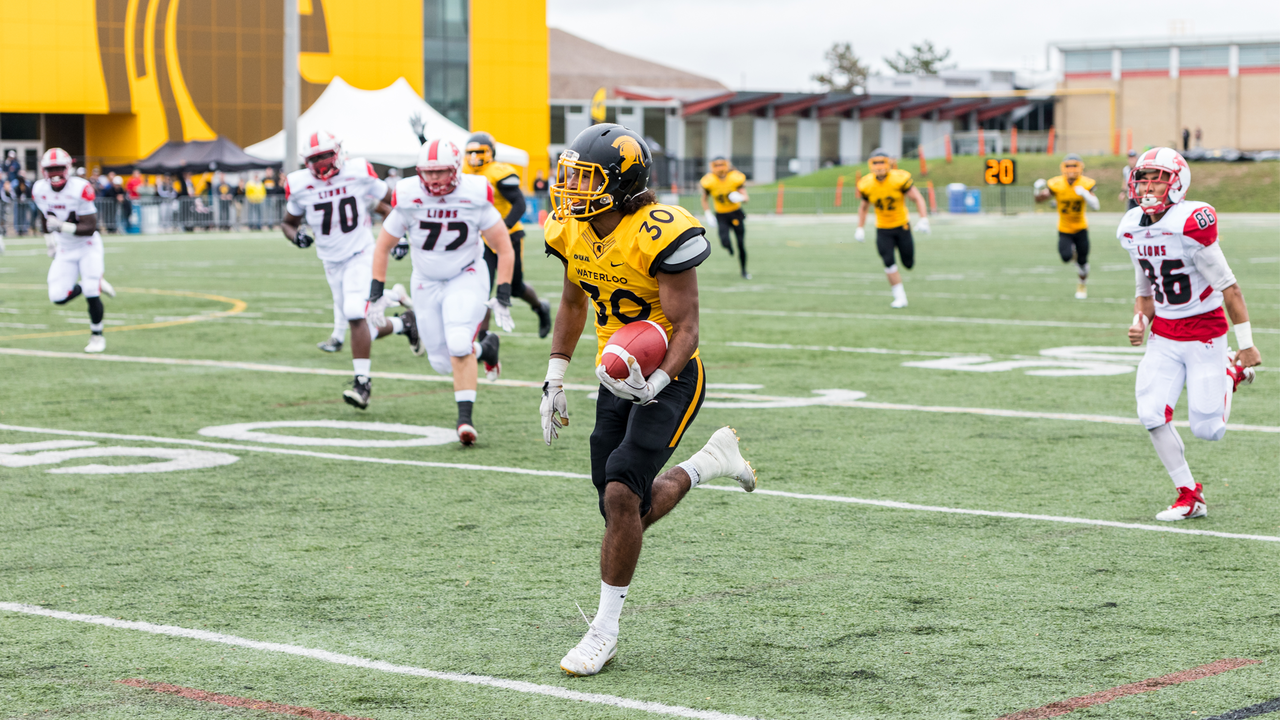
A championship mindset
Thanks to alumni support, student-athletes and team leaders Tre and Tyrell Ford are pursuing dream careers in professional football.

Thanks to alumni support, student-athletes and team leaders Tre and Tyrell Ford are pursuing dream careers in professional football.
By Beth Bohnert Office of AdvancementThere were celebrations among Warriors football fans when Tre and Tyrell Ford announced in December 2020 that they would defer their CFL draft year and play a final season with the Black and Gold. The twin brothers say they wanted one last opportunity to help Waterloo capture its first Vanier Cup.
Tre (below, at left), a quarterback, and Tyrell, a cornerback, were originally attracted to Waterloo by the Faculty of Health’s Recreation and Sports Business program and the chance to play for head coach Chris Bertoia. In turn, the two All-Canadians have been instrumental in helping the team return to championship contention.
“Strength draws strength. Tyrell and Tre’s personalities, effort and character have helped us recruit other fine players and create a championship mindset,” Coach Bertoia says.

Tre and Tyrell Ford's leadership has been instrumental in helping Waterloo's football program rebuild, says head coach Chris Bertoia.
Waterloo Football’s holistic approach places equal emphasis on academics, athletics and leadership development. However, between schoolwork and the rigorous training schedule, it’s challenging for student-athletes to hold jobs during the playing season.
Over the course of their university careers, Tyrell and Tre have received athletic financial awards that allow them to focus on their studies and football. These include two awards created by alumni who experienced the lifelong advantages of being part of Waterloo’s football program and who want to pass those benefits on.

Twin brothers Tre (above) and Tyrell Ford (shown in banner image) are among the top 20 prospects eligible for the 2022 CFL Draft.
Rob Logan (BSc ’82) believes that the lessons he learned at Waterloo — teamwork, tenacity and time management — positioned him to be successful in both his career and personal life. That’s why he established the Logan Family Athletic Excellence Awards to support members of the football and women’s volleyball teams.
“I’d like to give that same opportunity to other student-athletes, with the hope that they return the favour down the road,” he says. “If more people do that, it will help us both as individuals and as a society.”
Steve Bennet (BA ’96), a former team captain and quarterback, notes that the relationships he formed with his team mates last to this day. “You experience something unique together. And you feel a connection to all the other generations of players who shared that experience.”
Steve created the Tuffy Knight Football Award to honour his mentor, the celebrated coach who led Waterloo to the Yates Cup in 1997. “This is my way of giving back to future generations of players and recognizing that connection we all have with the program.”
STEVE BENNET (BA ’96), Waterloo Football alumnus and donor
Athletes may play a game for three hours on Saturday but what people don’t realize is that they’ve dedicated countless hours to their sport. And that’s the part that creates men and women who become great leaders. Not what they did on the field – all the things they did before and after they got on the field.
As Tyrell and Tre prepare for their final season, they have a message for donors like Steve and Rob, who made it possible for them to earn their degrees, become team leaders and pursue dream careers in professional football.
“Thank you to all the people who donate to help student-athletes stay financially stable,” Tre says. “You’re helping us out more than you will ever know.”

Read more
The legacy of a beloved instructor supports Pharmacy students like Lisa Ros-Choi, who make a difference for individual patients and health care as a whole.

Read more
Generous donors like John Hamilton (BA ’73) are helping to connect talented Waterloo students with non-profits — and everyone benefits.

Read more
When Sharon Lamont (BA ’80) retired after decades of service to Waterloo, she didn’t want a gift from her colleagues. Instead, she gave one to our students.
The University of Waterloo acknowledges that much of our work takes place on the traditional territory of the Neutral, Anishinaabeg, and Haudenosaunee peoples. Our main campus is situated on the Haldimand Tract, the land granted to the Six Nations that includes six miles on each side of the Grand River. Our active work toward reconciliation takes place across our campuses through research, learning, teaching, and community building, and is co-ordinated within the Office of Indigenous Relations.